As the daughter of a United Nations diplomat, you might say that the study of international relations is in Sabrina Hoque’s blood.
She most of her childhood travelling and living abroad: eight years in Thailand and 10 in Ethiopia, where her family witnessed the fall of the Communist regime of Mengistu Haile Mariam in 1991.
“Needless to say, the sights and sounds of guns, bombs, tanks, armed soldiers and everything else involved with regime change was enough to leave a lasting impression and a lifetime’s worth of fascination with political affairs,” she says.
Ms. Hoque is now a PhD candidate in Dal’s Department of Political Science and already has an impressive list of accomplishments. As the former acting deputy director for the Centre for Foreign Policy Studies at Dalhousie and lead facilitator for the Canadian Red Cross’ "Even Wars Have Limits" advocacy group, Ms. Hoque has planned numerous outreach events and facilitated public outreach on diverse topics related to foreign affairs, security, and humanitarianism.
Considering what lies ahead
More recently Ms. Hoque earned media attention for co-editing a collection of essays with fellow Dalhousie doctoral candidate Sean Clark entitled Debating the Post-American World: What Lies Ahead.
 The book, which discusses the prospect of a future in which the United States is no longer a global superpower, contains essays from some of the field’s top thinkers, including American intellectual and CNN contributor Farid Zakaria, author of the bestselling book The Post American World.
The book, which discusses the prospect of a future in which the United States is no longer a global superpower, contains essays from some of the field’s top thinkers, including American intellectual and CNN contributor Farid Zakaria, author of the bestselling book The Post American World.
Ms. Hoque explains that the project came about as the result of a suggestion from a colleague. Both authors had also noted a “baffling hole in the IR textbook market” with regards to this subject and felt that this book would be useful to both students and academics.
“It has been our experience that students are eager to consider and discuss the potential for a truly massive shift in the international distribution of power,” she says. The collection, split into five parts, discusses the question of whether we are headed for a so-called post-American world. “In other words,” explains Ms. Hoque, “will America retain a leading role in world affairs, or will its slippage mirror the fallen titans of ages past?”
Part of a community
Presently, Ms. Hoque is in New York working for the United Nations Development Programme and researching her dissertation, which looks at how the UNDP’s Democratic Governance program has contributed to democratization in the Asian Pacific area.
As she nears the end of her time as a graduate student, she would encourage future or current graduate students to make the most of their time in academia.
“Being part of the academic community allows you to have access to a wealth of resources right at your fingertips,” she says, and adds that it’s important to try to go to as many conferences, lectures, presentations and brown-bag lunches as possible.
Which is not to say that grad school should be all work and no fun. “Enjoy the experience!” she says. “It’s very easy to lose sight of the end goal and get bogged down by the process of courses, papers, comprehensive exams, grading papers, etc. [But] you [will] find that the knowledge and discipline gained through this process comes in very handy at multiple stages during graduate school and beyond.”
Ms. Hoque and Mr. Clark’s book, Debating A Post-American World: What Lies Ahead? can be purchased on Amazon.ca.

